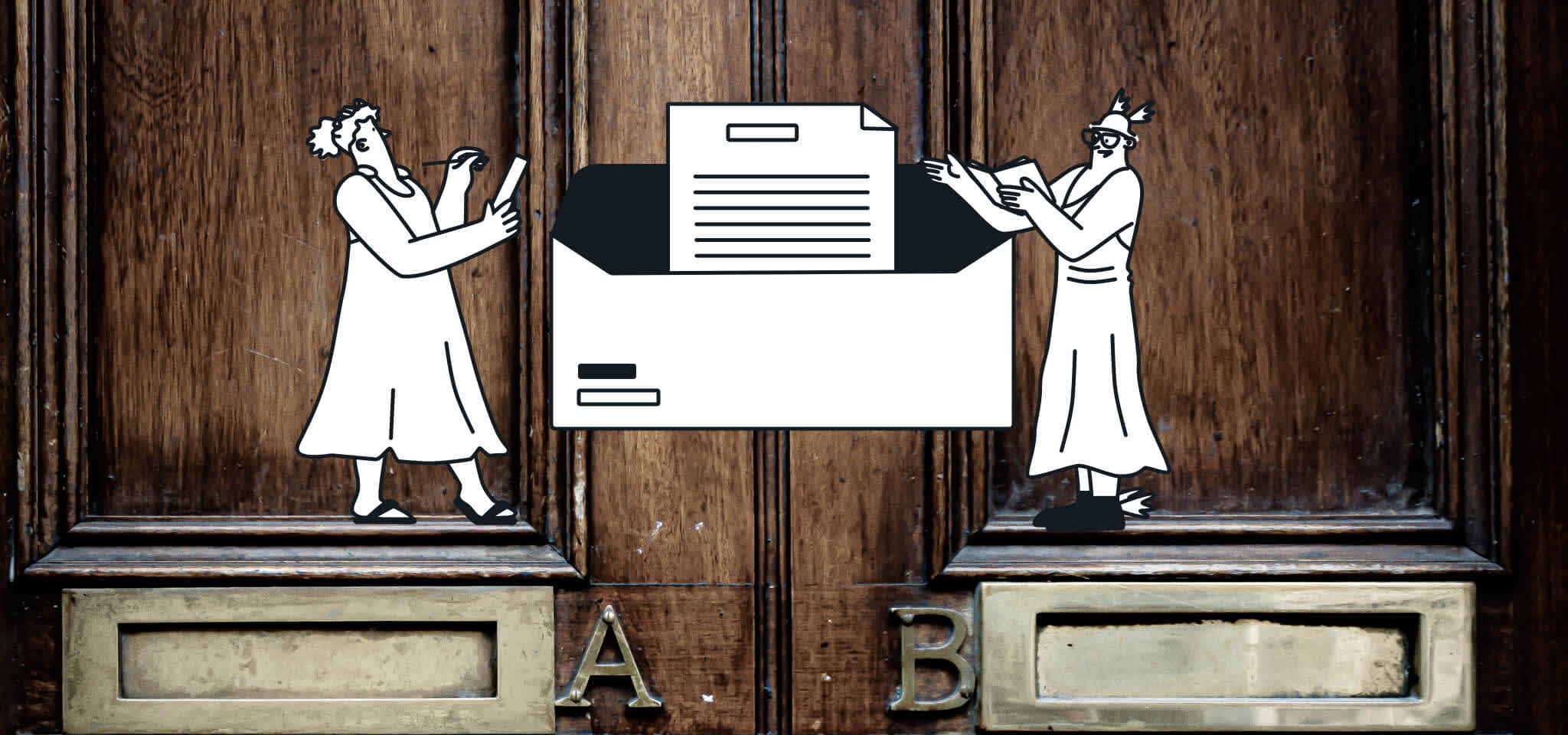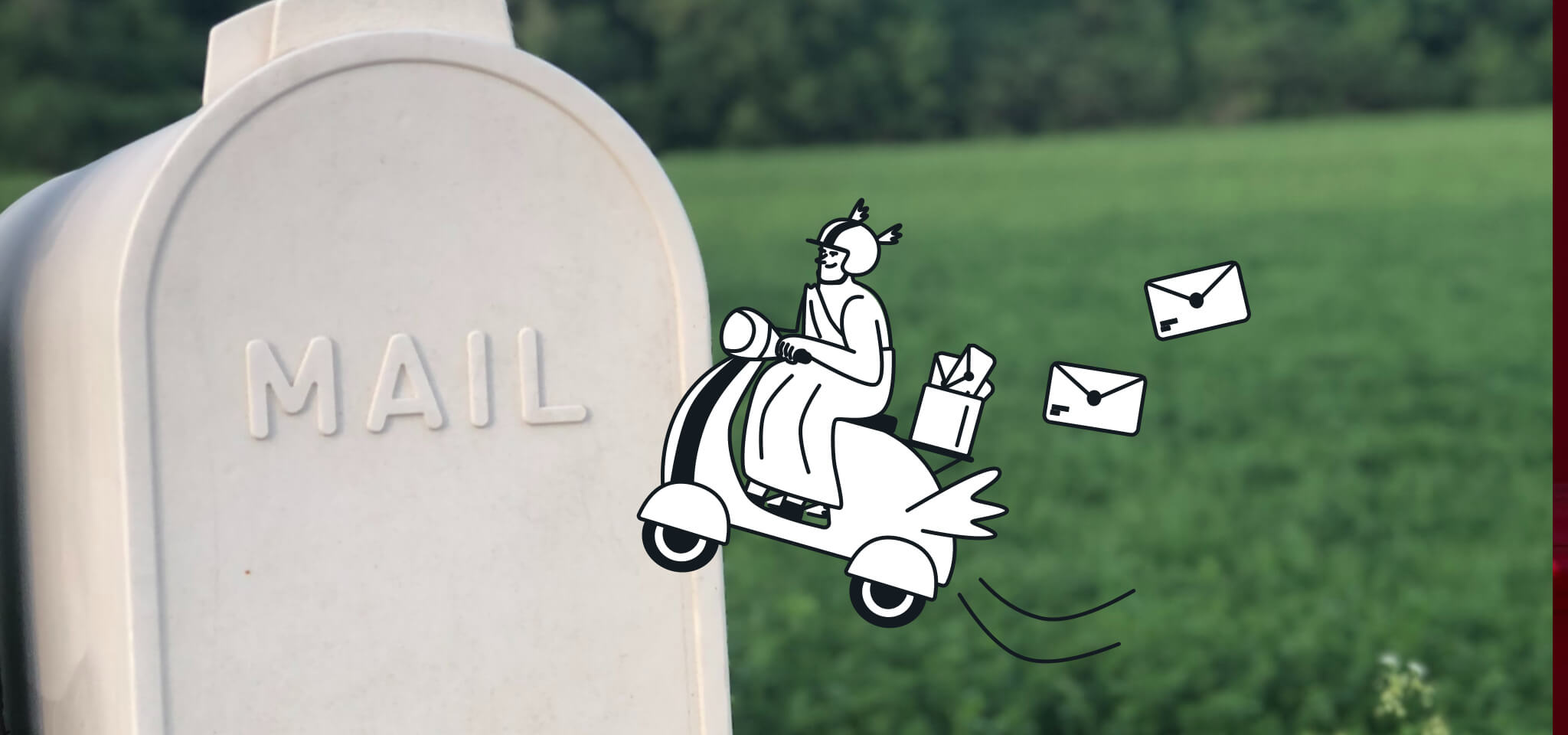Email Best Practices
8 email marketing statistics that can supercharge your business
There’s a misconception that if something is old, it is somehow less useful. While email has been around for over 30 years, its usefulness has never wavered. We’ll run through six powerful statistics that illustrate the impact of email marketing.

PUBLISHED ON
Have you ever heard someone claim email marketing is dead? What about the claim that it would slowly decline as social and digital communication channels took hold?
This prediction has proved to be wide of the mark, with email marketing continuing to thrive and serve as one of the four most influential drivers of digital traffic.
If you still buy into the idea that email marketing is moribund, you may be missing out on the chance to grow your business. To encourage you to reconsider, here are eight compelling statistics that underline the actual value of email marketing in the digital age. Stop sending average emails, boost your average open rate, and give your email subscribers the best messages in their inboxes.
Table of content
1. Business can be personal: 59% of best-in-class marketers rank personalization as a top engagement tool
2. Make your emails fun: CTR increases 300% with video content
3. Email audiences love consistency: 51% of consumers like weekly emails
4. Email still rules King: 75% consumers say email is their preferred channel
5. A staggering return on investment (ROI): $41 for every $1 spent
6. Reach a huge audience: 4 billion people use emails
7. Re-engage cold leads: 20% of customers claim to open and click on abandoned cart emails
8. Get customers to click-through: 45.7% say deals, coupons, and codes
Monitor analytics
A/B test
Use segmentation
What is email marketing?
Email marketing, or rather, designing an email marketing campaign, involves an individual or business sending emails to a group of people to raise awareness about news, products, or services.
Email marketing is one of the most effective ways that B2B marketers engage repeat or new customers and broaden their client or user base. Email marketing's performance as a communication tool can be measured according to many key performance indicators (KPIs), including sales, subscriptions, survey submissions, and others.
Today's businesses exercise their B2B email savviness by implementing email marketing tactics such as newsletters and accomplishments. In this way, customers feel a more profound sense of connection to the businesses they subscribe to. The value they receive from this email marketing content benefits the sender, too.
The beauty of email marketing? While low risk and low cost, it can yield stunning results for businesses that invest their time and resources into producing such content. Not convinced? Here are some statistics.
8 email marketing statistics
1. Business can be personal: 59% of best-in-class marketers rank personalization as a top engagement tool
The key to increasing engagement and email open rates with email marketing content is doing everything you can to reel in your audience. So, throw away those standard pitches, because today's email audience can smell you trying to sell them something from a mile away. Now, you might be asking, “how can I turn a cold lead into a warm customer acquisition?”
The answer lies in personalized emails: targeted, individualized content derived from audience segmentation and strategic content writing. What do we mean by this?
Well, think about your audience as groups of different types of people rather than an indecipherable blob. This can help narrow the content you're writing so it can speak directly and on a more personal level. In this way, you'll be able to address your audience's needs and build a more sustainable and meaningful relationship. You’ll be providing them with substantial value.
We suggest shooting straight and asking your audience what kind of content they'd like to see from you. A/B testing and surveys can be an ideal way to get started. Then, once you have a better idea of your target demographic's pain points, you can give them content that provides them with meaningful value.
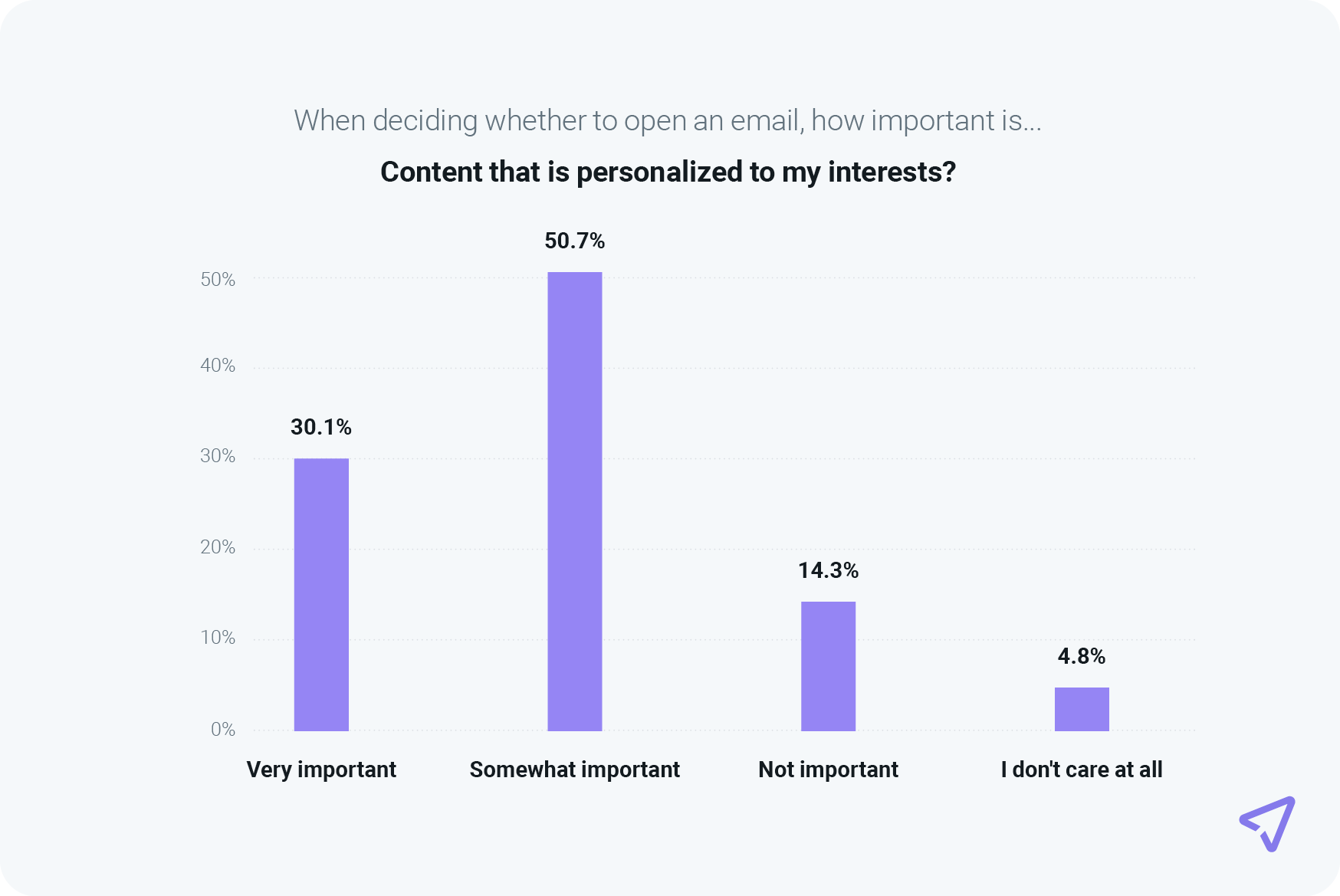
According to our study for Inbox Insights, 59% of best-in-class email marketers put personalization as the most successful tool for engagement, a close second after content quality. And it seems like customers agree – our research The path to email engagement found that 30% of recipients consider personalization a very important element when deciding whether to open an email.
So, get creative with your welcome emails, promotional emails, and everything else. Communicate on a human level and show your audience that you're not just a marketing automation robot.
30% of recipients see personalized content based on interests as very important when deciding to open an email. – The path to email engagement 2024
2. Make your emails fun: CTR increases 300% with video content
The days of emails featuring static text on a plain background are long gone. Email recipients expect razzle-dazzle; some eye candy to draw them into your world and brand voice. Many content opportunities are at your disposal with tools like podcasts, videos, or clickable links like infographics, GIFs, emoji hamburger menus, and widgets that link to a blog.
Take video, for instance. Sure, it can take effort and capital to produce, but it doesn't have to be complex. Keeping things simple can be just as effective. Besides, we've got the data to confirm that your click-through rate (CTR) increases by 300% when your email content includes video.
You can cultivate an aesthetically pleasing vibe, but it doesn't have to be your only motive. After all, your goal is simply to hold people's attention and keep them interested. So put in the time to make sure that there's plenty to look at, read, or consume in your email marketing content, and you're sure to optimize your KPIs.
Keep in mind that over 60% of traffic comes from mobile in 2024. When designing the best email newsletter for marketing, your template should also be optimized for mobile devices, like iPhones, tablets, everything! Keeping your digital marketing and ecommerce content consistent across all screen sizes will create trust in your brand. Audiences will see you as reliable, no matter how they consume your content.
We put together a detailed guide to creating responsive emails for getting your campaigns ready for mobile. If you’re already using our platform, you can take advantage of the responsive Email Editor as well as mobile-friendly templates.
3. Email audiences love consistency: 51% of consumers like weekly emails
Human beings are creatures of habit. We like knowing things, like where our next meal is coming from and where we'll sleep at night. The same is true for emails we receive in our inboxes.
People warm up to emails they anticipate. In other words, your open rate will go up, and your unsubscribe rate will stay low when your audience has opted in to receiving your content and looks forward to receiving it. As soon as your content becomes inconsistent, it feels sloppy and resembles something a fraudster might send. And you don't want that.
According to our friends at Statista, 51% of consumers like receiving weekly branded email content. This proves that if your audience hasn't unsubscribed from your contact list, it means they want to hear from you.
Be careful not to over-do it though. Data from our 2024 Email Engagement report shows that the most common reason for respondents unsubscribing from email lists was receiving too many messages from brands. So make sure you land on a cadence that strike a balance with your audience.

4. Email still rules King: 75% consumers say email is their preferred channel
While technology continues to advance at an unprecedented rate, and the communication channel options for consumers seeming endless, you might be surprised to see that the King, still, sits firmly upon on his throne.
Research from our recently published Email Engagement report shows that 75.4% of consumers in the U.S., UK, France, Germany, and Spain chose email as their preferred channel for receiving promotions from brands. Additionally, 74% also chose email as a preferred channel for transactional communication.
So, the next time someone tries to tell you that “the King is dead,” you can respond, well, “long live the King!”

5. A staggering return on investment (ROI): $41 for every $1 spent
Email marketers know that there's no worse feeling than increased spend on client communication without seeing any results. Well, rest assured that the odds are stacked in your favor when it comes to email marketing content.
On average, email marketing ROI is expected to sit pretty at 4100%. To break that down, you'll see $41 for every dollar you invest into your customer outreach (£35.41 for every £1 spent).
This isn't some trade secret, either. 59% of digital marketers agree that email marketing is one of the most consistent drivers of ROI. So if you can't beat them, join them.
6. Reach a huge audience: 4 billion people use emails
We understand the impulse to invest in social media ad spending for lead generation or attracting your target demographic. But while the general consensus is that social media is where brands can spread their messaging the widest, the pool of email users continues growing exponentially.
An estimated 4 billion people use emails to date, and there’s no sign of that number shrinking any time soon. In fact, experts are gauging that number will reach a crescendo of 4.6 billion in 2025.
If you've ever considered where you should focus your attention to reach your target audience, set your sights on email. Billions of people use this form of communication, and the audience is already primed to receive content from businesses and brands they engage with.
Despite the growth of social platforms, the number of email users will continue to grow by 15% from 2020-2025. - Statista
7. Re-engage cold leads: 20% of customers claim to open and click on abandoned cart emails
Can we let you in on a little secret? We've got three words for you: abandoned cart emails.
If you're an avid online shopper, then you know the moment when you get distracted while putting things in your digital cart at checkout. When this happens, businesses set up an automated email template to nudge budding customers and remind them to return to the items they've left unattended.
But sometimes, that one extra ping isn't enough. As we suggested earlier, you shouldn't shy away from sending emails weekly and you shouldn't shy away from sending or automating multiple abandoned cart emails either. Because our recent survey shows that re-engagement and win-back emails result in more recipients engaging. We found that 20% of abandoned cart recipients read, then clicked a link and 29.1% said they saved them for later.
So, once you've finally attracted customers to what your business offers, don't let them fall by the wayside. Reminding your audience about their forgotten purchase through email marketing can be an excellent practice for your business.
8. Get customers to click-through: 45.7% say deals, coupons, and codes
So, you’ve done the hard work in getting subscribers to open your email, but as you know that’s only half the battle. Now you’ve got to get them to act on your CTAs.
Research from our 2024 path to engagement shows that the three main reasons for subscribers clicking through from an email to a brand’s website were:
To claim a deal or use a coupon code (45.7%)
To learn more about an offer or topic (36.3%)
To view featured products (28.2%)

Of course, you’re not the only competing for customer attention in a crowded inbox. To stand out you will have to do something a little different to generate buzz around the promotion or the product.
Boost your email marketing strategy
At this point, we hope we've persuaded you to view email marketing as a valuable asset. Or maybe you’ve already applied these strategies but want to step up your digital marketing game. Here are a few tips to take your email marketing to the next level.
Monitor analytics
As the adage suggests: If at first you don't succeed, try, try again. If you're not hitting the conversion rate you want, tracking your analytics is your best friend. After all, Einstein said, “Insanity is doing the same thing over and over again and expecting different results.” Email marketers should keep a close eye on analytics tools to reach their desired benchmarks – and reach a higher conversion rate.
Pro tip: Give yourself room to fail. Finding success through email marketing doesn't happen overnight. So don't be precious with your content. Send out the best stuff you can, then budget your time so you can assess what worked and what didn't. Then, re-evaluate, make some tweaks, and send out your next piece of content. Iteration is key.
A/B test
There's something extraordinary about the simplicity with which A/B testing succeeds as an email marketing tool. When you're unsure which of your two options to choose, you can use this technique to test each version on different audience clusters and then monitor their success rate.
In a way, A/B testing is like a stepped-up, more specific survey. Consider a scenario in which you're deciding between two email subject lines for this week's email newsletter. You could send a survey to your entire audience asking which one they would respond more favorably to. But why do that when you can segment your audience, send out both versions, and track analytics to see which version is more successful?
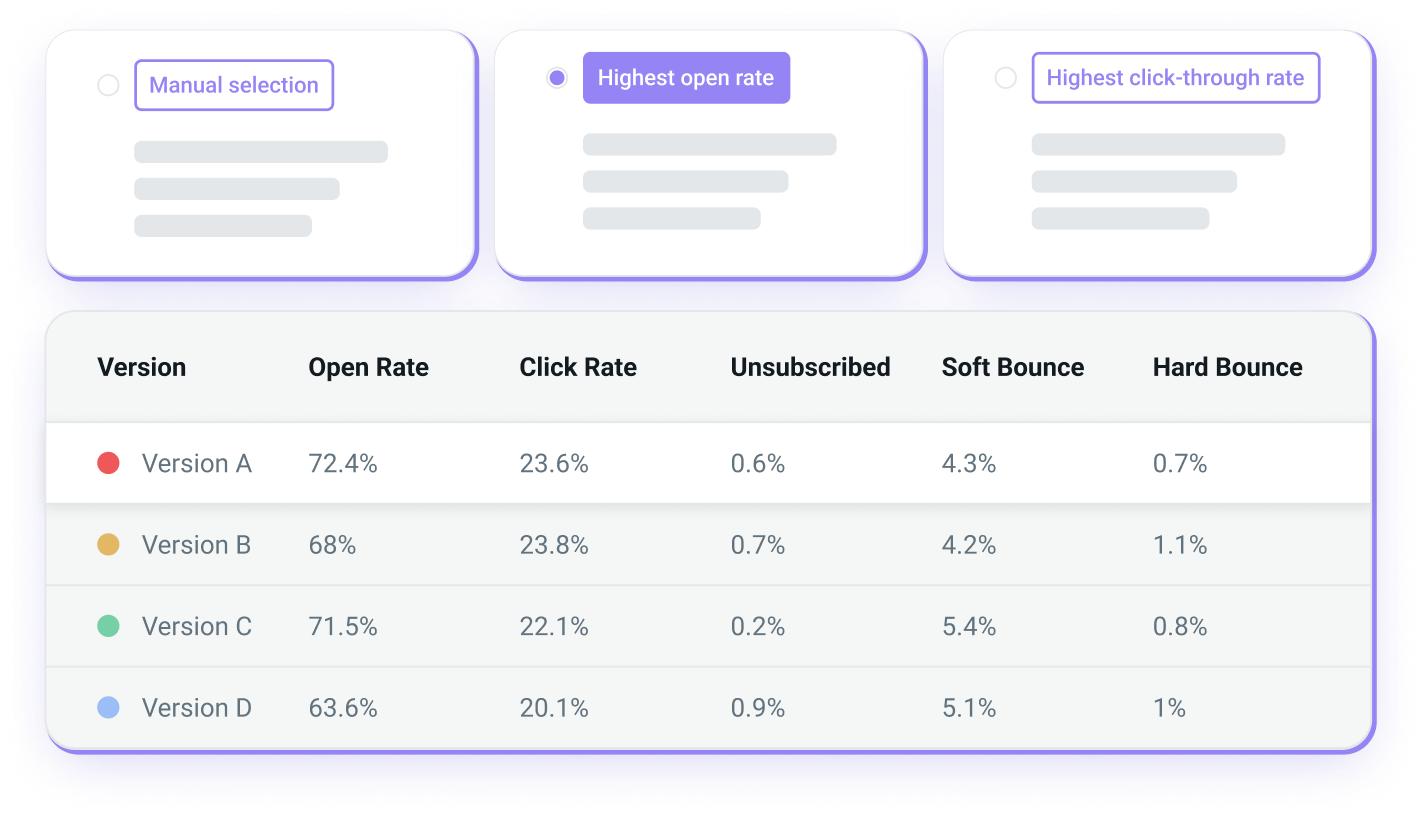
Over time, this process encourages experimentation and can yield the results you're looking for. By figuring out how you can tweak your content, you might discover new optimization techniques to stimulate your email marketing content and drive up your KPIs.
Use segmentation
We've learned how email segmentation is crucial for your content marketing arsenal. By dividing your audience into cohorts based on similar characteristics, you can create content that targets their pain points, increasing your likelihood of reaching a conversion or a higher CTR.
When deciding how to segment your customer base, we encourage you to consider the various demographics of your audience. For instance, people living in a particular geographic location might not have the same needs if their lives revolve around hot or cold weather. Other demographics to consider might be age, gender, purchase frequency, and browsing behavior.
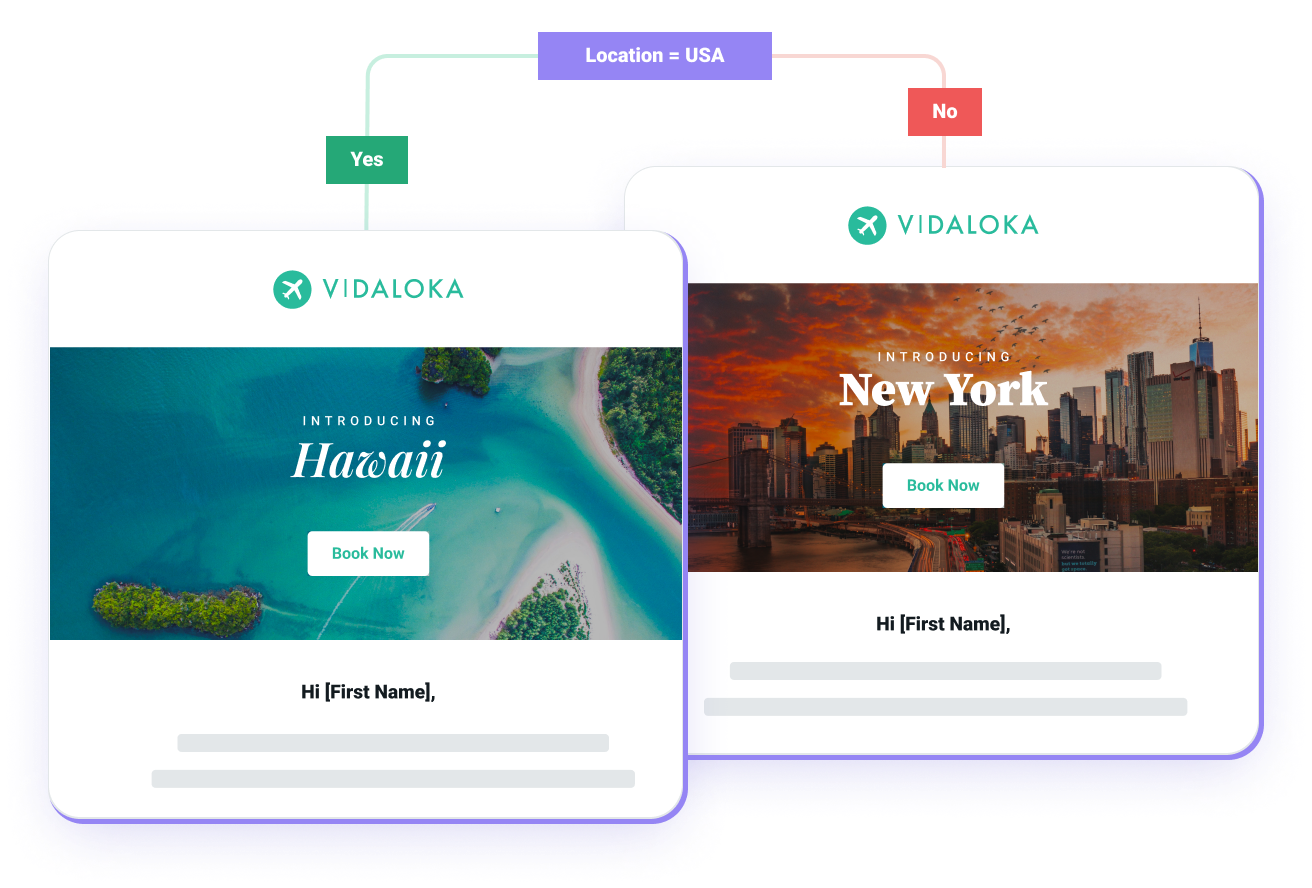
Ultimately, leveraging segmentation as a tactic can dictate the content you create and even the voice in which your content is written. Because you wouldn't use the same language talking to a millennial peer as you would to your grandmother, right? Once you've carefully calculated how to address the units within your audience, you will be one step closer to that higher KPI you're looking for – ROI, call-to-action (CTA), or otherwise.
Email marketing lives on
So there you have it. Email marketing is alive and well, and anyone would be hard-pressed to convince us otherwise. Is there anything stopping you from building your email list with confidence and improving your ROI with the data on your side?
And yet, while we can assure you that the stats we've put forth are accurate, the truth of the matter is that email marketing is an evolving field. In the same way that we encouraged you to use A/B testing, you should also continue learning and experimenting with your content. Figure out what works best as promotional communication for your brand or business.
We hope you feel incentivized to assemble a whole picture of who your target buyer is and what makes them tick. By sincerely putting yourself in their shoes, your content will address their problems and align with their behavior.
We encourage you to take advantage of our platform's tools. With Mailjet’s marketing capabilities, it's easy to implement strategies like automation, templates, launching a newsletter, and monitoring subscriptions. At Mailjet, we want to help launch your business into the stratosphere.
We've provided the springboard. Now it's time for you to take the leap.
Email marketing
Mailjet’s all-in-one email marketing solution
When searching for an email marketing solution, going with a provider that scales and offers advanced features and ease of use is crucial. Mailjet lets you build email templates and email campaigns, automate, send, and monitor your email marketing campaigns.




